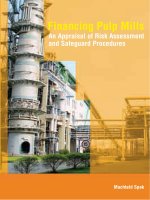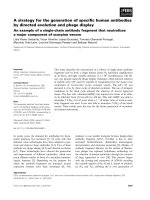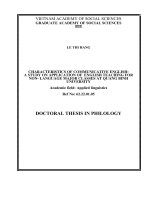An appraisal of major English courses for bachelor''s of arts
Bạn đang xem bản rút gọn của tài liệu. Xem và tải ngay bản đầy đủ của tài liệu tại đây (326.91 KB, 8 trang )
TRIBHUVAN UNIVERSITY JOURNAL, VOL.: 31, NO.: 1 & 2, JUNE/DEC. 2017
215
AN APPRAISAL OF MAJOR ENGLISH COURSES
FOR BACHELOR'S OF ARTS
Sushil Lamichhane*
ABSTRACT
The purpose of this article is to identify the strong and weak aspects
of the major English courses of three year Bachelor's programme under the
faculty of Humanities and Social Sciences in Tribhuvan University. This
article is primarily based on the library research along with the discussions
carried out with the teachers of major English. The courses are appropriate
and relevant as they impart the knowledge of both literature and literary
theories but have holes in the system of teaching learning activities and
evaluation system. This article attempts to provide some suggestions for
pedagogic implications to the concerned authorities accordingly.
Key words: Bachelor's level courses, major English, analysis, relevance,
strengths, weaknesses.
INTRODUCTION AND OBJECTIVE
This article attempts to analyze the existing courses of B.A major
English under the Faculty of Humanities and Social Sciences in Tribhuvan
University. The students of major English in B.A. level have faced many
problems in grasping the knowledge and skills from the theory plus
literature based courses due to many problems even though the courses
have link up with the courses of higher secondary education. Students are
also baffled with by the techniques applied by the teachers in teaching
learning process. The courses are designed to evaluate the students only
by the annual evaluation system. The teaching and evaluation system has
also created problems to the students to internalize the literary theories.
Many teachers become unfriendly to the students to impart more practical
approach of teaching because they feel that they have no role in evaluating
the students. This leads to the decrease in the qualities as well as size of
the students in the subjects. So, this article has tried to evaluate how far the
prescribed courses are suitable and whether the instructional techniques,
evaluation schemes the courses include are strong and relevant. It will be
helpful to English teachers and major English students who face difficulties
*
Mr. Lamichhane is Teaching Assistant in English, Bhojpur Multiple Campus,
Bhojpur, TU.
216 AN APPRAISAL OF MAJOR ENGLISH COURSES FOR BACHELOR’S OF ARTS
in dealing with these courses and others who are interested in English will
also be benefited. This article analyzes only the existing courses of major
English in three year Bachelor's level under the faculty of Humanities and
Social Sciences.
Students of major English at Bachelor level in Humanities and
Social Sciences, TU have to take five papers. Although the senior teachers
through their papers in seminars have tried to provide different guidelines
to make teaching learning activities more effective to achieve the goals of
the courses, none of them have tried to analyze these courses systematically
and critically. The problem with reference to the use of these courses still
lies in their instructional techniques and evaluation system. The study had
the following objectives:
• to analyze and evaluate the major English courses of three year
Bachelor's of Humanities and Social Sciences in TU.
• to find out the strengths and weaknesses of the courses.
• to suggest for pedagogic implications.
Ghimire (2003) completed a research work entitled An Analysis of
Link English Course for PCL First Year and Grade XI. The main objective
of this study was to analyze the Link English course in term of its adequacy
of the contents. It was concluded that the text book lacks emphasis on
oral practices. In his similar research entitled An Analysis of the Textbook
Expanding Horizons in English, Joshi (2010) concluded that the textbook
had given sufficient exercises; more focus was given to reading and writing.
The textbook encompassed meaningful items for reading although it was
not free of criticism.
In his workshop paper, Pandey (2017) mentioned that the main
problem of teaching literary texts to the B.A. level students is the lack
of teach ability. He concluded that the traditional lecture method and the
habit of teachers had been making the teaching learning activities more
problematic in this level. Joshi (2017) in his workshop paper has pointed
out that it was difficult to deal with poetry because poetry was complex in
it's nature, form and subject matter. He suggested to follow the system of
language of poetry to understand a poem. None of the above mentioned
reviewed works analyzed and explored the strengths and weaknesses of the
courses of B.A. major English. This article has somehow tried to analyze
the courses and present strengths and weaknesses respectively.
217
TRIBHUVAN UNIVERSITY JOURNAL, VOL.: 31, NO.: 1 & 2, JUNE/DEC. 2017
ANALYSIS METHOD AND INTERPRETATION
This article is primarily based on library research and textual analysis.
• Introduction of the Courses: The existing major English courses for
the three year Bachelor's level had been effective since 2065 B.S.
According to the syllabus compiled by TU Curriculum Center (2008)
the courses were designed with the following objectives.
• To equip students with a sound background for the serious study of
literature.
• To give students standard and cutting edge materials to study.
• To give students appropriate tools for interpreting, understanding and
creating texts.
The courses are comprised of 5 papers, each carrying 100 marks.
The courses are theoretical in nature. Among these papers, the students in
the first year should study one paper, likewise two papers in the second
year, and two papers in the third year respectively (Table 1).
Table 1: Courses Title and Assigned Year.
Code No.
Paper
Course Title
Year
Eng. 311
First
Western Intellectual Tradition and Literary
Theory
First
Eng. 312
Second
Prose :Essays and Short Stories
Second
Eng. 313
Third
Drama and Film
Second
Eng. 314
Fourth
Poetry
Third
Eng. 315
Fifth
Critical Thinking and Practical Criticism
Third
Source: Curriculum Development Centre, TU (2008).
The first paper of B.A Major English consists of two components,
i.e. Essays on Western Intellectual Tradition and Literary Theories. Essays
on Western Intellectual Tradition covers twelve essays and in Literary
Theory seven different theories are introduced and gives the ways to analyze
a text. In this section, The Great Gatsby a novel by F. Scott Fitzgerald has
been analyzed using different approaches to literary criticism. The second
paper of B.A major English course is prose and it consists of essays and
short stories. This paper aims to introduce the elements of essays and fiction
to the students. In essay section, students are prescribed to read four essays
with commentaries and other six essays by different writers. In short stories
218 AN APPRAISAL OF MAJOR ENGLISH COURSES FOR BACHELOR’S OF ARTS
section, students are prescribed twelve stories to read and the commentaries
of three stories have been mentioned. Here students should read and discuss
the stories on the basis of its theme. The weight age of both sections is
equal. The third paper of B.A major English course consists of Drama and
Film. This paper aims to introduce context, modes and elements of drama.
It also aims to introduce the elements of film. In drama section, four dramas
are prescribed to deal with their different aspects. In film section, elements
of film is given with more priority. The drama section covers 80 percent
weight age and film section covers 20 percent weight age respectively. The
fourth paper of B.A major English course consists of poetry. This paper aims
to introduce the elements of poetry, analyzes twenty seven different poems
of writers of different periods. Here the students can approach the poems
theme wise and style wise. The fifth paper is Critical Thinking and Practical
Criticism. This paper aims to introduce creative and critical thinking to the
students and to analyze a text by applying different theories. This paper
provides a considerable section of logic and the use of language in critical
and creative thinking. It also provides some texts for the application of
modern literary theories.
Relevancy and integration of contents of the courses: The contents of the
existing courses of B.A major English seem appropriate for the Bachelor's
level as they have been developed on the root of Higher Secondary major
English. The students will easily entertain the courses by optimum utilizing
their previous background of English literature and language. The courses
provide adequate knowledge about literary theory through different forms
of literature. The courses are relevant with the need of education system of
the contemporary society. The relevancy of the courses is very important to
fulfill the objectives of the need of students, society and the nation. Following
this spirit, KC (2008) focuses on the need based syllabus, it finally increases
the implementation level of the courses and they will certainly increase the
needs and wants of the learners, society and the nation at large and in a
better way. The courses are relevant for this level due to their realistic and
attainable objectives. The organization of the courses is much specified.
The courses show vertical and horizontal relationship making linkage with
Higher Secondary and M.A. major English. They provide the knowledge of
theory and literary moments. The literary genre like poetry, drama, essay,
short story, novel etc. prescribed in the courses help to build up the concept
of the elements of literature, approaches of analyzing a text B.A major
English course also have horizontal relationship with each other. The first
TRIBHUVAN UNIVERSITY JOURNAL, VOL.: 31, NO.: 1 & 2, JUNE/DEC. 2017
219
and the fifth paper both provide the knowledge of theory and the ways
of analyzing the text on the light of different theories. Practical Criticism
component of the fifth paper is totally based on the literary theory section
of the first paper. Second, the third and the fourth paper are also interrelated
in their theme, movement, style, subject matter, etc. The courses provide
texts from both American and British writers. We can find integration of
theoretical and literary aspects in these courses. These courses are the
continuity of Higher Secondary major English courses and provide the way
ahead for M.A. major English courses.
Instructional techniques and evaluation system: The major English
courses of three year B.A do not clearly provide the instructional techniques
for teaching learning activities. The courses give freedom to the teachers
to choose the suitable teaching methods. The teachers can use lecture
method as well as discussion method to make their class more effective.
Supporting this view, Thapa (2017) focuses on the use of reflective and
questioning methods for teaching learning activities. He suggests to carry
out the suitable method as the teacher thinks to make his teaching relevant.
For teaching literary theory, he further recommends that the course calls
for reorienting our teaching towards more reflective and questioning
pedagogy. A decade long practice of teaching literature in Bachelor's level
shows that the contextual method is more suitable. Suggesting in the use
of suitable pedagogy of teaching theory, Pandey (2016) focuses on the
internalizing the literary theory to the teachers by using the right kind of
pedagogy. The teachers should encourage students to look the text from
different theoretical perspectives. Likewise, for teaching drama, role play,
group work, peer work, dramatization will become more effective if applied
properly. Discussions with the teachers showed that close, careful reading
of poem and recitation are suitable methods for teaching poetry. The teacher
should focus on performance to make poetry class more effective. Careful
consideration of the poem's overall design such as language, figures of
speech, structure, style, title, theme, etc. Are necessary for analyzing the
poem. The teacher should provide the students with sufficient knowledge
of the poem's background like time, view point and cultural context to make
the message of the poem clear. Since the courses do not suggest instructional
techniques in specific, there is enough space to use lecture method and it has
been one of the reasons of losing opportunity to achieve expected results in
B.A. major English.
220 AN APPRAISAL OF MAJOR ENGLISH COURSES FOR BACHELOR’S OF ARTS
The evaluation system of B.A major English courses are
conventional annual examination system. There is no role of teacher in
evaluating the students. Even though this kind of evaluation system is
suitable for the job holder and irregular students as it follows the marking
system and they do not have to complete the assignment, it can not evaluate
the students 'practical knowledge. The courses lack the student centered
evaluation system. In this evaluation system, students are only focused for
final examination.
Resource materials and time allocation: Three year Bachelor's level major
English courses have advanced courses to fulfill the general objectives of
this level. Text books are easily available in Nepali market. Reference books
of some papers are not easily available throughout the country. For the
reference books, the students should depend upon the tutors and libraries.
Sometimes teachers are also suffering from the lack of reference books.
All the courses have limited time hours. Teachers are given 150 hours to
complete each course. But due to seen and unseen hindrances; many teachers
are unable to complete their courses in time. To cope with this, teachers can
connect one course with other courses or with previous knowledge that the
students have already acquired. For example, to teach the fifth paper, the
teacher can connect with the first paper and can maximum utilize the time
on the new issues.
Strengths of the courses
The major English courses of three year Bachelor's level have
following strengths:
●● The courses attempt to impart the skills of inquiry, logical reasoning
and taste for reading literature in students.
●● The courses attempt to look forward to making linkage to the M.A.
major English and have prepared the ground for a more critical and
detailed study of literature and other human disciplines at the post
graduate level.
●● The courses attempt to fulfill the general objectives of the three year
B.A. level and the national objectives of education of our country.
●● The courses try to explain the main literary theories at present
and provide the ways to analyze literary texts by applying those
theories.
TRIBHUVAN UNIVERSITY JOURNAL, VOL.: 31, NO.: 1 & 2, JUNE/DEC. 2017
221
●● The courses bring together the varieties of prose (essays, short stories,
novel), poetry and dramas of different periods with different issues.
●● The textbooks prescribed in the courses are very suitable to fulfill
the objectives of the course of study and they are easily available in
the Nepalese markets in low price.
●● The courses provide the teachers with enough space to use any
instructional technique; as a result, teachers are free to use suitable
teaching method to apply for effective teaching learning activities
according to the context.
Weaknesses of the courses
The major English courses for the three years Bachelor's level have
the following weaknesses:
●● The courses do not explore the social, political cultural and
economic aspects of Nepalese Society. Nepalese students are not
familiar with the contexts shown in the courses.
●● The courses cover no or less language portion in the contents which
is essential to study and analyze the literary texts.
●● The courses do not sufficiently discuss about the burning issues of
present time.
●● Some papers are theoretical and lengthy, so there is a bit challenge
to complete the course in the limited boundary of time.
●● Text books prescribed in the courses are available in the market but
the reference books are not easily available in the Nepalese market,
even if they are available, it is very costly for the students.
●● The courses lack the student centered evaluation system.
CONCLUSION
In nutshell, the three year Bachelor's level major English courses
attempt to develop the linkage between the Higher Secondary and M.A.
major English courses of T.U. by introducing literature and theory. The
courses also introduce some important literary tools which are basic to
apply, to interpret and to peel down the meaning of a text. The courses
are useful to develop in students the skills of logical reasoning, inquiring,
synthesizing and interpreting. The main problems of the courses lie in the
evaluation system and the pedagogy that need through change. The courses
will be stronger and market friendly if the following points are considered.
222 AN APPRAISAL OF MAJOR ENGLISH COURSES FOR BACHELOR’S OF ARTS
• The courses should include the burning issues of contemporary society.
• The courses should focus more on practical aspects rather than only
theoretical aspects.
• Language portion should be increased in the courses.
• The courses should be designed to explore social, political, cultural,
and economic aspects of our society. For this well written materials of
Nepalese authors should be included in the courses.
• Evaluating students through only annual examination system should
be changed and internal evaluation system should be implemented.
Teachers should be encouraged for changing their teaching and should
apply student centered method.
WORKS CITED
Ghimire, P.B. (2003). An Analysis of the Link English Course for PCL
first year and Grade XI. Kirtipur: An unpublished M.Ed. thesis
submitted to faculty of Education, TU.
Joshi, A.R. (2017). Reading the Language of Poetry. An unpublished
workshop paper presented at the workshop of TU English teachers.
Biratnagar: TU.
Joshi, M.R. (2010). An Analysis of the Textbook 'Expanding Horizons in
English' .An unpublished M.Ed. thesis submitted to faculty of
Education, Surkhet Campus. TU.
KC, K.B. (2003). Critical analysis and evaluation of the existing compulsory
english syllabus of higher secondary. Journal of NELTA.Vol.8,
(1-2). Kathmandu: NELTA.
Pandey, B. (2017). Practice of Critical Theory in College Classroom. An
unpublished workshop paper presented at the workshop of TU
English teachers. Biratnagar: TU.
Thapa, A. (2017). Critical Thinking and Practical Criticism: An Introduction
to the Course and Proposed Teaching Strategies.An unpublished
workshop paper presented at the workshop of TU English teachers.
Biratnagar: TU.
TU Curriculum Centre, (2008). Curriculum for three year bachelor level
programme in English. Kirtipur: Curriculum Development Center, TU.









